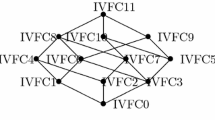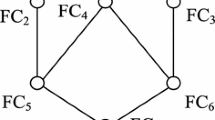Abstract
Formal Concept Analysis (FCA) is a mathematical framework for analysing data tables that capture the relationship between objects and attributes. The concept lattice derived from such a table is a representation of the implicit knowledge about this relationship, where each concept corresponds to a bicluster of objects and attributes. FCA has been widely used for knowledge acquisition and representation, conceptual data analysis, information retrieval and other applications. In this paper, we use an extension of the classical FCA to deal with fuzzy formal contexts, where the relationship between objects and attributes is modelled by truth values indicating the degree to which an object possesses a property or attribute. Fuzzy Formal Concept Analysis (FFCA) allows us to capture vague or imprecise information and handle uncertainty or ambiguity in data analysis. Our purpose is to use aggregation functions in order to manipulate and explore fuzzy formal concepts in different ways depending on the desired properties or criteria. In this work, we will focus on the structure of the extents of the concept lattice. We define the aggregation of fuzzy extents point-wise and study how it affects its structure. We characterise the aggregation functions that preserve the fuzzy extent structure and show that they depend on the number of objects in the context. Our results contribute to a better understanding of how aggregation functions can be used to manipulate and explore fuzzy formal concepts.
Access this chapter
Tax calculation will be finalised at checkout
Purchases are for personal use only
Similar content being viewed by others
References
Andrews, S.: Making use of empty intersections to improve the performance of CbO-type algorithms. In: Bertet, K., Borchmann, D., Cellier, P., Ferré, S. (eds.) ICFCA 2017. LNCS (LNAI), vol. 10308, pp. 56–71. Springer, Cham (2017). https://doi.org/10.1007/978-3-319-59271-8_4
Bejines, C., Ardanza-Trevijano, S., Chasco, M., Elorza, J.: Aggregation of indistinguishability operators. Fuzzy Sets Syst. 446, 53–67 (2022)
Beliakov, G., Pradera, A., Calvo, T., et al.: Aggregation Functions: A guide for practitioners, vol. 221. Springer, Heidelberg (2007). https://doi.org/10.1007/978-3-540-73721-6
Bělohlávek, R.: Fuzzy Relational Systems. Springer, Heidelberg (2002). https://doi.org/10.1007/978-1-4615-0633-1
Calvo, T., Kolesárová, A., Komorníková, M., Mesiar, R.: Aggregation Operators: Properties, Classes and Construction Methods, pp. 3–104. Physica-Verlag, Heidelberg (2002). http://dl.acm.org/citation.cfm?id=774556.774559
Ganter, B., Wille, R.: Formal Concept Analysis: Mathematical Foundation. Springer, Heidelberg (1999). https://doi.org/10.1007/978-3-642-59830-2
Jana, C., Pal, M., Wang, J.: A robust aggregation operator for multi-criteria decision-making method with bipolar fuzzy soft environment. Iran. J. Fuzzy Syst. 16(6), 1–16 (2019)
Krajča, P., Outrata, J., Vychodil, V.: Advances in algorithms based on cbo. In: Kryszkiewicz, M., Obiedkov, S.A. (eds.) Proceedings of the 7th International Conference on Concept Lattices and Their Applications, Sevilla, Spain, 19–21 October 2010, CEUR Workshop Proceedings, vol. 672, pp. 325–337. CEUR-WS.org (2010)
Kuznetsov, S.O., Makhalova, T.: On interestingness measures of formal concepts. Inf. Sci. 442, 202–219 (2018)
Pedraza, T., Ramos-Canós, J., Rodríguez-López, J.: Aggregation of weak fuzzy norms. Symmetry 13(10), 1908 (2021)
Pedraza, T., Rodríguez-López, J., Valero, Ó.: Aggregation of fuzzy quasi-metrics. Inf. Sci. 581, 362–389 (2021)
Poelmans, J., Kuznetsov, S.O., Ignatov, D.I., Dedene, G.: Formal concept analysis in knowledge processing: a survey on models and techniques. Expert Syst. Appl. 40(16), 6601–6623 (2013). https://doi.org/10.1016/j.eswa.2013.05.007
Acknowledgments
This research is partially supported by the State Agency of Research (AEI), the Spanish Ministry of Science, Innovation, and Universities (MCIU), the European Social Fund (FEDER), the Junta de Andalucía (JA), and the Universidad de Málaga (UMA) through the FPU19/01467 (MCIU) internship and the research projects with reference PID2021-127870OB-I00 and PID2022-140630NB-I00 (MCIU/AEI/FEDER, UE).
Author information
Authors and Affiliations
Corresponding author
Editor information
Editors and Affiliations
Rights and permissions
Copyright information
© 2023 The Author(s), under exclusive license to Springer Nature Switzerland AG
About this paper
Cite this paper
Bejines, C., López-Rodríguez, D., Ojeda-Hernández, M. (2023). Aggregation Functions and Extent Structure Preservation in Formal Concept Analysis. In: Ojeda-Aciego, M., Sauerwald, K., Jäschke, R. (eds) Graph-Based Representation and Reasoning. ICCS 2023. Lecture Notes in Computer Science(). Springer, Cham. https://doi.org/10.1007/978-3-031-40960-8_3
Download citation
DOI: https://doi.org/10.1007/978-3-031-40960-8_3
Published:
Publisher Name: Springer, Cham
Print ISBN: 978-3-031-40959-2
Online ISBN: 978-3-031-40960-8
eBook Packages: Computer ScienceComputer Science (R0)




